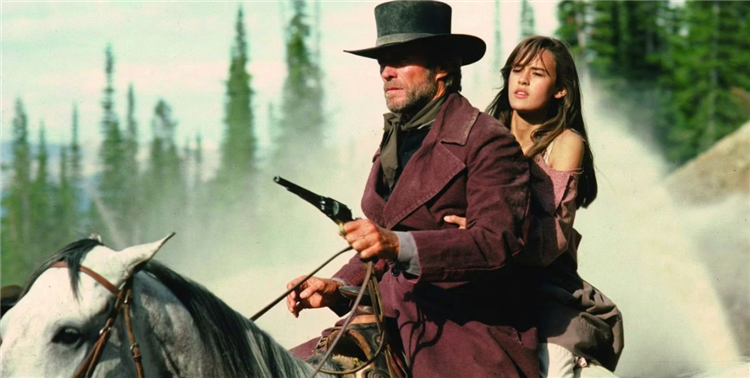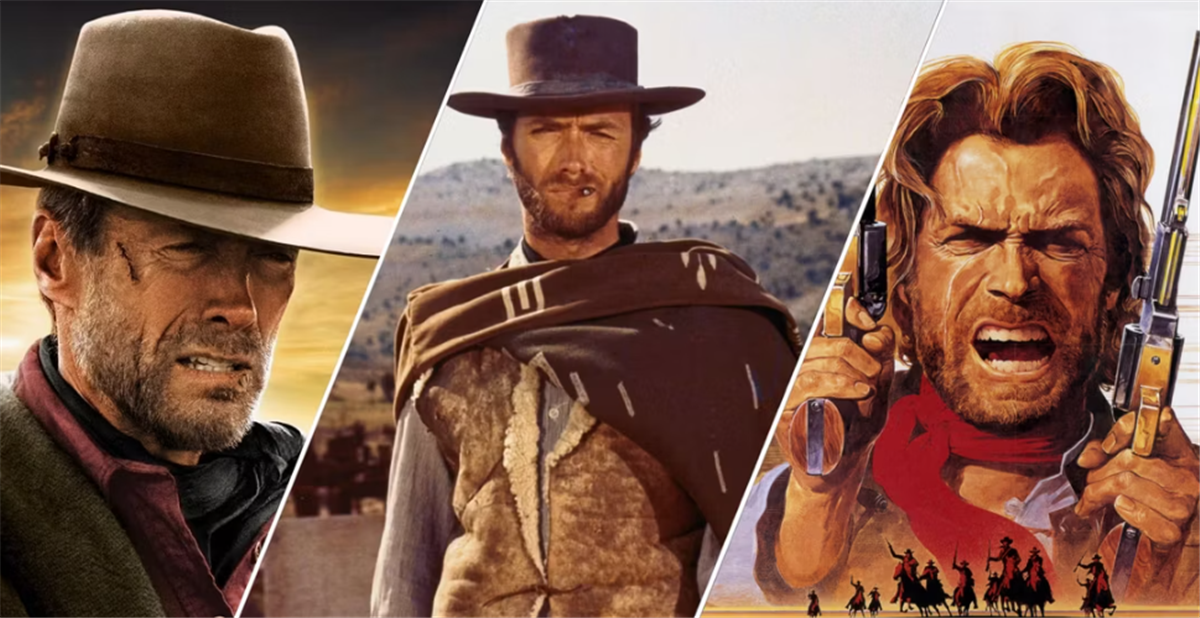Few actors are as closely tied to the Western genre as Clint Eastwood is. His first big break came from a Western TV show called Rawhide way back in the late 1950s, and then by the mid-60s, his profile grew further thanks to being cast in three movies by famed Spaghetti Western director Sergio Leone. By the time the 1970s came around, Eastwood was both acting and directing, and the Western genre was one he frequently returned to in both capacities.
His decades spent playing people in the Old West – usually of the antihero variety – means he’s portrayed plenty of iconic characters throughout his career. With news that his next directorial effort is likely to be his last, now is a great time to look back on Eastwood’s impact on the Western genre by going over some of the most iconic bounty hunters, marshalls, and outlaws he’s portrayed.
1/10
The Man with No Name from ‘The Dollars Trilogy’ (1964-1966)
Clint Eastwood’s first starring role in a Western might well remain his most memorable to this day… or, depending on how you look at it, his three most memorable. The Dollars Trilogy made him a full-blown movie star and pop culture icon, with each film in the trilogy – 1964’s Fistful of Dollars, 1965’s For a Few Dollars More, and 1966’s The Good, The Bad, and The Ugly – being better than the last.
The trilogy is a loose one, with Clint Eastwood being the only person in all three who (probably) plays the same character in all three. It can be hard to tell, given he gets a new nickname in all each of them (Joe, Manco, and Blondie). There’s also a chance that The Good, The Bad, and The Ugly is actually a prequel, but in any event, the movies are iconic, and Eastwood is too across the entire trilogy. It makes sense why these movies all but defined Eastwood as a movie star for the next 50+ years.
2/10
Josey Wales from ‘The Outlaw Josey Wales’ (1976)
One of Clint Eastwood’s most acclaimed Western roles outside The Dollars Trilogy came from playing the titular character in The Outlaw Josey Wales. The film revolves around Wales seeking vengeance alone, but eventually becoming acquainted with a gang of outcasts he inevitably feels compelled to fight for.
It’s one of the best Westerns Eastwood ever directed, too, given he was just as much of an ace behind the camera as he was in front of it when it came to this genre. It’s certainly a tougher and more gritty Western than those generally found in the 1950s and 60s, but is definitely a must-watch for Eastwood fans who’ve somehow let it slip them by.
3/10
Preacher from ‘Pale Rider’ (1985)

As Pale Rider demonstrates, the films in The Dollars Trilogy aren’t the only times Eastwood’s Western characters went only by a nickname. In Pale Rider, he plays a man known only as “Preacher,” with the film revolving around his character defending a small village from a mining company that’s after their land.
As far as premises go, this kind of thing is Western 101, but given Eastwood stars and directs, there’s a level of polish and entertainment value to it that keeps it very watchable. Westerns weren’t exactly in fashion during the 1980s, but a movie like Pale Rider coming out right in the middle of the decade shows Eastwood wasn’t giving up on making them anytime soon.
4/10
William Munny from ‘Unforgiven’ (1992)
It’s to everyone’s benefit that Eastwood didn’t give up on Westerns in a post-1980s world, seeing as one of his very best came out in 1992. That movie was the Oscar winner Unforgiven, which is a particularly tough, often brutal, and sometimes sad Western about an aging bounty hunter taking on a corrupt sheriff.
For winning Best Picture and three other Oscars (including Best Director for Eastwood), it’s arguably the actor/director’s best Western, or at least his most acclaimed. Eastwood shines in the lead role, but certainly doesn’t try to steal the spotlight from an incredible supporting cast that includes Gene Hackman, Morgan Freeman, and Richard Harris.
5/10
Marshall Jed Cooper from ‘Hang ’em High’ (1968)
Hang ’em High might be one of the lesser-known Eastwood Western roles out there, but is still worth checking out for fans of his. It focuses mostly on telling a revenge story, with Eastwood’s Marshall character surviving a hanging and swearing vengeance on those who tried to kill him.
For Western fans, such a story told in a straightforward way may not offer too many surprises, but this is still Eastwood being talked about here. As such, there’s a certain level of cool, sophistication, and stoicism that one can expect from the Western legend himself, and all that’s still fun, even if the movie itself is just so-so.
6/10
The Stranger from ‘High Plains Drifter’ (1973)

High Plains Drifter was another film that was instrumental in furthering Eastwood’s reputation as a Western icon. He’s not even given a nickname here, playing a character known only as “The Stranger,” which naturally adds to his mystique, and the sense that he’s playing some sort of Old West legend here.
The plot of High Plains Drifter involves Eastwood’s character coming into a new town, killing several men that tried to gun him down, and then being hired by the town to kill several more outlaws who are on their way. Nothing revelatory here, but it’s a little darker than some of his 1960s Western roles, and can therefore be seen as a stepping stone between something like The Dollars Trilogy and the even more violent The Outlaw Josey Wales.
7/10
Mike Milo from ‘Cry Macho’ (2021)
Cry Macho is likely to end up being the final Western Clint Eastwood will ever star in. It’s a fitting send-off to the kind of character he’s become well-known for playing, with this modern-day Western story involving Eastwood’s character, Mike Milo, being asked to locate his ex-boss’s son, who’s run off to Mexico.
Eastwood was over 90 years old when he directed and starred in this movie, so those expecting any big action scenes or shootouts might not be looking in the right direction. Still, it’s a gentle and fairly compelling movie when viewed on its own terms, and will likely stand as a nice – albeit bittersweet – farewell from Eastwood to the genre that made him a star.
8/10
Hogan from ‘Two Mules for Sister Sara’ (1970)
Even though he’s featured prominently in the film, Eastwood is surprisingly billed second here, with Shirley MacLaine in the title role being the film’s lead. The story here centers on the titular Sister Sara, with Eastwood saving her from a gang of bandits, with the film then being about the various misadventures the two go on together.
It’s a fairly solid Western all around, and it’s worth watching to see two screen titans – Eastwood and MacLaine – go head-to-head. It’s also notable for being directed by Don Siegel, who would also work with Eastwood on other great films released during the 1970s, including Dirty Harry and Escape from Alcatraz.
9/10
Joe Kidd from ‘Joe Kidd’ (1972)

Written by the great Elmore Leonard, Joe Kidd is another lesser-known but still worthwhile Western starring Clint Eastwood. Here, he appears with Robert Duvall, with both actors playing characters who get wrapped up in a dispute between a band of Mexicans who go up against a landowner and a group of contract killers.
It all leads to dramatic, bloody conflict in the way you’d expect most Westerns to go, but it’s overall aided by the sharp dialogue typical of Elmore Leonard. While it narratively doesn’t cover much ground that will surprise Western fans, the fact that it involves two actors as great as Eastwood and Duvall in the lead roles should be enough to make it worth at least one watch.
10/10
Pardner from ‘Paint Your Wagon’ (1969)
Anyone who’s ever wondered what a Western/musical starring Clint Eastwood would look like need not look any further than Paint Your Wagon. That’s indeed what this very unusual 1969 Western is, with it (more specifically) centering on a prospector and a farmer who form an uneasy alliance while mining for gold in California.
Said uneasy alliance also involves sharing a wife, which naturally leads to a good deal of conflict and romantic tension that’s surprisingly (largely) played for laughs. It’s very strange and kind of uncomfortable overall, but that can sort of add to its entertainment/novelty value, in a way. Also, Clint Eastwood sings a song called “I Talk To the Trees,” for anyone not yet sold on this bizarre yet strangely memorable film.
